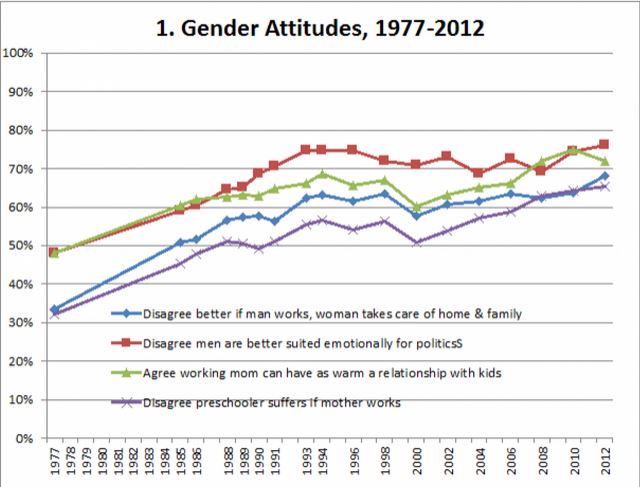
Are we getting closer towards achieving gender equality or have the trends begun to reverse?
Dr. David Cotter, chair of Union College’s sociology department, dissects shifting attitudes toward gender bias.
Dr. David A. Cotter is Professor of Sociology at Union College. His research focuses on stratification and inequality, particularly rural poverty, and work-related gender inequality. Some of his recent research in gender inequality which looks at variations in occupational segregation and earnings inequality across labor markets has been funded via grants from the National Science Foundation. The results of this research have been published in major journals including The American Sociological Review, The American Journal of Sociology, Social Science Research, Rural Sociology, and Work and Occupations. He is currently working on a book manuscript on poverty and inequality in rural labor markets. Dr. Cotter has also conducted research on service learning as a pedagogical tool, and helped to develop a set of syllabi and instructional materials for the American Sociological Association. Professor Cotter teaches courses on work and occupations, community, religion, and research methods.
Gender Inequality Trends
![]()
For more than a decade now, my colleagues Joan Hermsen and Reeve Vanneman and I, along with other researchers, have been struck by a stall in what had been a remarkably rapid increase in gender equality in the United States.

Data from a range of sources suggests that during the 1990s, our society’s substantial progress toward general gender equality was slowed, stopped, or even reversed on a number of fronts, including employment, earnings, occupational and educational segregation, gender attitudes, housework, and the holding of political office.
Gender role attitudes – what’s deemed appropriate for men and women to do or be – have been a key ingredient in this shift and stall. And recently we’ve observed a return to the egalitarian trends as measured by a set of questions that have been asked repeatedly since the mid-1970s.
For example, when asked whether they agree or disagree that “It is much better for everyone involved if the man the achiever outside the home and the woman takes care of the home and family” attitudes underwent a massive transition from 2/3 embracing “traditional” positions in 1977 and 2/3 embracing the “egalitarian” position by 1994.
But between 1994 and 2006 they remained essentially unchanged, even drifting back toward the more traditional position so that 42% embraced the breadwinner/homemaker model in 2000. Since 2006, these attitude measures have resumed the egalitarian trend though at a slower rate than in the 1980s so that in 2012, the most recent survey, 68% of Americans rejected the male breadwinner/female homemaker ideal.
It is not yet clear how long, or how far, this rebound will proceed. Nor is it clear why it stalled or started back up. What is clear is that the issue of gender equality remains complicated.
Read More: Washington Post: Public views working moms more favorably, study finds
